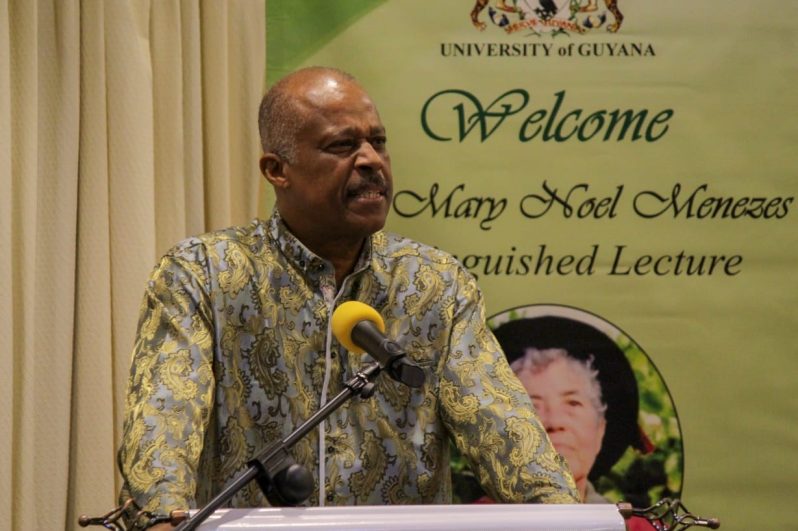THE CARICOM Reparations Commission (CRC) is calling upon European leaders to engage in a three-day Reparations Summit as part of prerequisite formal dialogue needed to advance action on the Caribbean region’s call for reparatory justice.

Since 2013, when the CRC was established by the Caribbean Community (CARICOM) heads of Government, the body has been the region’s mechanism for lobbying for reparatory justice for the historical crimes against humanity committed in this region for centuries. These crimes against humanity include native genocide and enslavement.
On Monday, via a media engagement, Chairperson of the CRC and Vice-Chancellor of the University of the West Indies (UWI), Professor Sir Hilary Beckles, renewed the Caribbean’s call for European governments to take responsibility for these crimes committed and the legacy of underdevelopment faced by the people of the Caribbean which ensued.
“The CRC is calling for a reparations summit, in much the same way that the region met with the European governments to discuss independence, this is phase two of the independence process- the meeting in a summit, over three days, to discuss how to honour this debt owed to the Caribbean at this moment in history,” the CRC Chairperson said.
Explaining what the three-day summit will encompass, Professor Sir Beckles highlighted that Day One of the summit will feature talks between Caribbean and European governments; Day Two should feature conversations with the private sector organisations in Europe, many of which Sir Beckles reminded emerged out of and were enriched by the crime against humanity; and finally, Day Three should have engagement with civil society individuals and institutions, such as the many universities and the churches which also benefitted during the period of enslavement.
This summit, Professor Beckles said, would allow for a segway into the “Phase Two” of the Caribbean’s exit from colonialism. “We have argued, in the Caribbean, that reparatory justice is about development; that Britain and Europe do indeed owe a debt to this region- a debt that is recognised, a debt that can be computed and a debt that is historically sound in terms of its legitimacy,” Professor Beckles said.
The renewed calls for advancement of the Caribbean reparatory justice agenda came amidst the current global activism on systemic racism and inequality and the statements of “apology” and/or “regret” from some European states and a number of British commercial enterprises for their role in the trans-Atlantic slave trade and in the 200-plus years’ practice of chattel slavery. In June, it was reported that Lloyd’s of London, the world’s oldest insurance market, and pub chain Greene King would take steps to make their businesses more racially inclusive and provide financial support to black and minority ethnic groups, after apologising for their role in Trans-Atlantic Slave Trade of enslaved Africans.

Greene King’s founder Benjamin Greene was compensated by the UK government when he relinquished slaves on his sugar cane plantations in the West Indies. Lloyd’s insured ships which transported the enslaved Africans and the family of Simon Fraser, a founding subscriber of Lloyd’s of London, owned slaves on an estate in what is now Guyana. European governments have issued statements of “regret”, not apologies, for their role in the crime against humanity in the eighteenth and nineteenth century. However, these governments have not been receptive to engagements on reparatory justice.
However, Professor Beckles firmly stated, “Apologies are not enough.” Rather, he contended that apologies should be an indication that the harm done has been acknowledged and that there is agreement that negotiations and discussions on how to repair that harm will follow.
He stressed the need for dialogue and diplomacy, particularly to discuss CARICOM’s Ten-point plan for reparatory justice and development of the entire Caribbean region. This plan outlined the path to reconciliation and justice for the victims and descendants of the crimes through its 10 tenets: the issuance of a full and formal apology; repatriation; indigenous peoples development programme; cultural institutions; alleviating the public health crisis, particularly the Caribbean’s susceptibility of chronic diseases (hypertension and diabetes) rooted in the plantation diet; illiteracy eradication; an African knowledge programme; psychological rehabilitation; technology transfer; and, debt cancellation.
“All across the region, successive governments have tried to bring development to the people as best as they can,” Barbados Prime Minister and Chairperson of the Prime Ministerial Sub-Committee on Reparations, Mia Mottley said. “But the problem is, as we do it, we are not finding a hospitable policy environment to allow us to be able to move to the next level.”
She detailed how the hindrances to the region’s development over the years is now further exacerbated by the COVID-19 pandemic, which will undermine the viability of the Caribbean nations in the medium-term.
“If we have to borrow money to stabilise our region, when the pandemic goes, you are already hearing that the region is highly indebted and any additional borrowing that comes is going to preclude our ability to remain focused on development, post-pandemic,” she said.
The economic decline that the region will continue to face- as it has already been vastly impacted by the loss of tourism- will further exacerbate the inherited ‘colonial mess’ from Britain and the other European nations. This is yet another reason why reparation just must be seriously considered at this time, she opined.
CARICOM is seeking reparatory justice from the former colonising nations of Europe, namely the United Kingdom, France, Spain, Denmark, Germany, the Netherlands, Portugal, Norway, Sweden and Switzerland. The regional body has advanced that there is an outstanding debt owed for the development of these nations at the expense of the underdevelopment of the Caribbean and its people.




.png)









